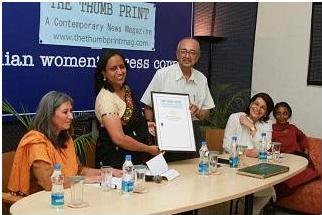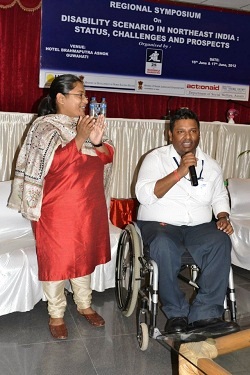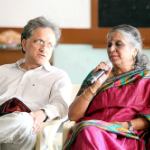Picture this - sunset on the Brahmaputra, an open terrace, the surrounding trees ruffle mildly in the evening breeze, birds noisily gather their last bites for the day, you meditate looking over the hills into the horizon - sounds perfect? Sigh! Even this picture perfect setting has its daily chink. It comes in the form of a ghost from our colonial past, every evening, come banpani or bordoisila. And it’s been making me question some delusions about the Indian democratic nation again.
This perfection of a locality in Guwahati happens to be within the earshot of the Raj Bhaban – the ubiquitously named governor’s residence in every state of India. The governor, although has a very perfunctory role within the Indian democracy, plays a significant role in the decorum of the same. Much like the retired grandfather in a feudal family in whose name the family haveli papers are and the wedding invitations are addressed to. Just like your feudal Indian grandfather, the governors too get to live in fancy houses called Raj Bhavan and a lot of lunch and dinner invitations.
But it is not the fancy houses that I am so bothered by. Now, apart from some petty material jealousy, I don’t have much against people who live in fancy houses. Not even when the houses are free. All the free lunch and dinner does bother me once sometimes, but I have learnt to live with that. I have also learnt to stay away from the two hour long traffic jams that happen that strike the Guwahati every time the governor moves from his fancy house to his lunch, dinner or high teas. Moving to that perfect location had given me the benevolence to forget these minor inconveniences life in an unplanned city brings. I have been listening to the birds and the ruffle of the trees and let people have their fancy houses and free lunches to themselves.
But no, it is not possible to remain aloof from the web of the establishment. You can run but you can’t hide. Every evening, as I mind my own business doing my yoga on the terrace, training the jealous mind to forget about other people’s fancy houses, the bugle calls. The bugle blows my detachment away and brings the nasty thoughts back.
For those of you not acquainted with the intricacies of how a democratic state is upheld, let me impart important knowledge. Rajbhavans, being one of the supreme pillars of the symbolic Indian democracy, raises and lowers the Indian flag every morning and evening. And really, there is nothing harmful in raising and lowering a national flag every day. But like all Indian rituals (mostly the Hindu ones), nothing can be done quietly. Here it is accompanied by the bugle call. This bothers me. First, like I said, it shakes my fragile meditative state of being. That call is loud. Second it brings disturbing images and thoughts to the mind. Every time I hear the bugle call I see a Birtish soldier:
Two thoughts accompany the image – colonial and military. And let me tell you none of this is good for 21st century post-modern, post-colonial peace of mind.
I try not to ponder on these thoughts. After all, having governors with no role to play in the democratic set up, giving them free houses (fancy at that) and lunch, high tea and dinner, blocking the roads for their travel and safety hassling thousands of citizens who have more pressing matters in hand are already bad signs for a free nation. But I have learnt to live with these have I not.
As I try not to think in my meditativeness, the sound of the bugle gushes inane thoughts into my emptiness – who plays a bugle in this age? Where does the guy learn to play the bugle? Is he sent for special training or do they hire a bugle player? Wait a minute, it must be a permanent job. That’s his job. Or do they come on short term contract? Are there many bugle players around? What about the bugle itself? Where do they buy it from? Who makes bugles? Who cleans it, takes care of it, makes sure it is not stolen? How many Indians does it take to play that bugle every day like clockwork?
And then the thoughts invariably veer towards money. They are actually spending money to buy that bugle, pay some people to have it blown every day for few minutes. But that’s my money. Is this what I pay my tax for? And most importantly why blow the bugle?
To stop my mind from being blown by the bugle, I decided to look up the net a bit. Here is what Wiki says, A bugle call is a short tune, originating as a military signal announcing scheduled and certain non-scheduled events on a military installation, battlefield, or ship. Historically, bugles, drums, and other loud musical instruments were used for clear communication in the noise and confusion of a battlefield. Naval bugle calls were also used to command the crew of many warships (signaling between ships being by way of signal flags.)
Is India a military nation? Did the British not introduce the bugle routine? When I last looked up India has been a free nation since the last Queen’s flag was lowered for the last time sometimes in 1947. Why then are you blowing it in my face every day? Why the last bugle was not sounded with the last flag? The whole thing is so colonial that I am sure the raj in the Rajbhavan refers to the raj. A hangover so bad that it is like you have not managed to change your puke stained clothes from the night before.
Talking about colonialism, the other day the president of India paid us a visit. As my bad luck always has it, he decided to attend some function right opposite my office. First armed security men took positions all over our building and buildings surrounding us. The road was cordoned off for a few kilometres on either side of the venue where he was coming. We could not move around. My boss quipped – it is like those British days. When the sahib used to come, all the natives were pushed down from the road.
Do I complain too much? Let me get back to my meditation and work at getting these negative thoughts out of my head before the bugle blows again!







































